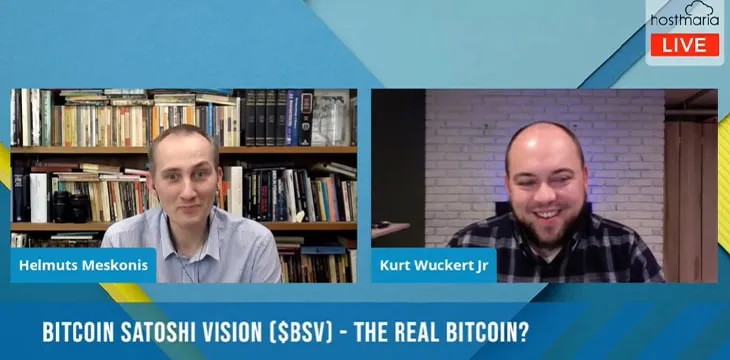|
Getting your Trinity Audio player ready...
|
“Bitcoin SV is the only complete implementation of the original Bitcoin protocol. It’s the only implementation of Bitcoin that has no block size limit. There are no limits that are not set by whatever the miners are willing to do,” Kurt Wuckert Jr. shared in a recent interview.
The CoinGeek chief historian joined Helmuts Meskonis on his HostMaria YouTube channel to talk about Bitcoin SV and what sets it apart from all the other implementations. He delved into the Bitcoin Civil War, educated the audience on how small blockers have derailed Satoshi’s original vision, how the Crypto Crime Cartel has focused their attacks on Dr. Craig Wright and what the future holds for Bitcoin.
Is Bitcoin SV the Real Bitcoin? Kurt Wuckert Jr. from https://t.co/aMrdYV5bxH https://t.co/BPOMZdR4A5
— HostMaria (@hostmariacom) December 17, 2020
Kurt recounted the struggles within the Bitcoin community, starting in 2017, between those inclined towards the Satoshi vision of big blocks and the small blockers who were led by selfish interests. This eventually led to the November 2018 hard fork that finally restored the original Bitcoin vision. The hard fork led to a civil war, one in which there was serious foul play by a cartel led by Roger Ver. However, eventually, Bitcoin SV emerged and has outgrown all the other implementations.
Over the years, the small blockers have managed to stamp out any effort to raise the block sizes. In one of the earliest instances, celebrated Bitcoin programmer Mike Hearn developed Bitcoin XT in 2014, a new node implementation capable of accepting 2MB blocks. At the time, he garnered a lot of support, especially from miners who saw a profitable opportunity. However, the small blockers went out of their way to conduct DoS attacks on Hearn, as well as other miners, pushing the narrative that Bitcoin XT was insecure.
On what sets BSV apart, Kurt pointed to the big blocks as one of the key differentiators. While BSV blocks are sometimes just a few megabytes, it has recorded 370MB blocks, and consistently clocks in 20-30MB blocks on regular basis.
The fees are also among the lowest in the industry, now currently at “1/100 of a penny.” In addition, miners on BSV are willing to offer lower fees to specific clients, Kurt pointed out. He cited Mempool, led by Lin Zheming, which has pioneered the direct negotiations for lower fees with BSV-powered businesses.
Kurt also debunked the myth that Calvin Ayre, founder of Ayre Group and CoinGeek, controls the majority of the BSV hashing power. This narrative has been used to misleadingly depict BSV as insecure and centralized.
“In fact the last I checked, Huobi, out of China, was the biggest miner on BSV. Also Binance, ViaBTC, Antpool—they all mine blocks on BSV. Calvin is not even a majority miner on BSV.”
On the other blockchain projects in the industry, Kurt was clear that he considers most as either illegal securities or outright scams. He listed Ripple’s XRP and Binance’s BNB tokens as illegal securities. The U.S. Securities and Exchange Commission (SEC) shares his view on the former, having filed an illegal securities lawsuit against XRP in December 2020.
“I tend to think every altcoin project is at best a hobby project, and at worst, and unfortunately most commonly, a blatant scam. I think Ethereum, Cardano, DASH are scams. TRON is the biggest scam in crypto in my opinion.”
Watch Kurt’s full interview here.

 06-30-2025
06-30-2025 





